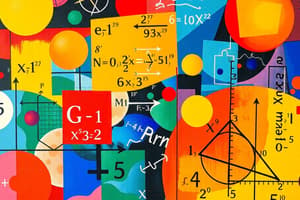Podcast
Questions and Answers
Which branch of mathematics primarily focuses on the study of rates of change and accumulation?
Which branch of mathematics primarily focuses on the study of rates of change and accumulation?
- Calculus (correct)
- Statistics
- Algebra
- Geometry
What type of numbers includes integers and rational numbers, but not irrational numbers?
What type of numbers includes integers and rational numbers, but not irrational numbers?
- Natural numbers
- Whole numbers
- Real numbers (correct)
- Complex numbers
In algebra, what type of expression involves a variable raised to a power?
In algebra, what type of expression involves a variable raised to a power?
- Polynomial expression (correct)
- Rational expression
- Exponential expression
- Linear expression
Which theorem is essential in Euclidean geometry for relating the lengths of sides in a right triangle?
Which theorem is essential in Euclidean geometry for relating the lengths of sides in a right triangle?
Which measure is used to describe the average value in a data set?
Which measure is used to describe the average value in a data set?
What type of numbers can be expressed in the form $a + bi$, where $a$ and $b$ are real numbers?
What type of numbers can be expressed in the form $a + bi$, where $a$ and $b$ are real numbers?
Which of the following concepts is primarily associated with the study of angles and shapes?
Which of the following concepts is primarily associated with the study of angles and shapes?
Which of the following is NOT a basic operation in arithmetic?
Which of the following is NOT a basic operation in arithmetic?
Flashcards
Arithmetic
Arithmetic
Arithmetic deals with basic numerical operations: addition, subtraction, multiplication, and division.
Algebra
Algebra
Algebra uses variables to represent unknown quantities, and provides methods to solve equations and inequalities.
Geometry
Geometry
Geometry studies shapes, sizes, and positions of figures, exploring properties of points, lines, angles, polygons, etc.
Calculus
Calculus
Signup and view all the flashcards
Statistics
Statistics
Signup and view all the flashcards
Natural Numbers
Natural Numbers
Signup and view all the flashcards
Integers
Integers
Signup and view all the flashcards
Real Numbers
Real Numbers
Signup and view all the flashcards
Study Notes
Fundamental Concepts
- Mathematics is the study of quantity, structure, space, and change.
- It uses symbols and formal systems to represent and manipulate these concepts.
- Key branches include arithmetic, algebra, geometry, calculus, and statistics.
Arithmetic
- Arithmetic deals with basic operations on numbers: addition, subtraction, multiplication, and division.
- It forms the foundation for more complex mathematical concepts.
- Includes concepts like prime numbers, factors, multiples, and divisibility rules.
- Uses whole numbers, integers, rational numbers, and real numbers.
Algebra
- Algebra uses variables to represent unknown quantities.
- It provides a systematic way to solve equations and inequalities.
- Key concepts involve solving linear equations, quadratic equations, and systems of equations.
- Includes polynomial expressions, functions, and graphs.
Geometry
- Geometry studies shapes, sizes, and positions of figures.
- It explores properties of points, lines, planes, angles, polygons, circles, and solids.
- Key concepts involve Euclidean geometry, coordinate geometry, and non-Euclidean geometry.
- Includes theorems like Pythagorean theorem and area and volume calculations.
Calculus
- Calculus is concerned with rates of change and accumulation.
- It involves differentiation (finding rates of change) and integration (finding accumulated quantities).
- Key concepts include limits, derivatives, integrals, and applications in physics and engineering.
- Common types are differential calculus and integral calculus.
Statistics
- Statistics deals with collecting, organizing, analyzing, interpreting, and presenting data.
- It uses numerical and graphical methods to understand patterns and trends in data.
- Key concepts include measures of central tendency (mean, median, mode), measures of dispersion (variance, standard deviation), and probability.
- Important in analyzing data and drawing conclusions.
Number Systems
- Natural numbers (counting numbers): 1, 2, 3, ...
- Whole numbers: 0, 1, 2, 3, ...
- Integers: ..., -3, -2, -1, 0, 1, 2, 3, ...
- Rational numbers: numbers that can be expressed as a fraction p/q, where p and q are integers and q is not zero.
- Irrational numbers: numbers that cannot be expressed as a fraction of two integers.
- Real numbers: the set of all rational and irrational numbers.
- Complex numbers: numbers that can be expressed in the form a + bi, where a and b are real numbers, and i is the imaginary unit (√−1).
Fundamental Operations
- Addition: combining two or more quantities.
- Subtraction: finding the difference between two quantities.
- Multiplication: repeated addition of a quantity.
- Division: splitting a quantity into equal parts.
Problem-Solving Strategies
- Identifying the unknown and the given information.
- Drawing a diagram or creating a model.
- Identifying patterns and relationships.
- Writing equations and solving them.
- Checking the solution.
Studying That Suits You
Use AI to generate personalized quizzes and flashcards to suit your learning preferences.




